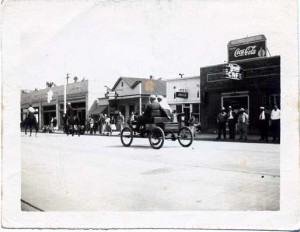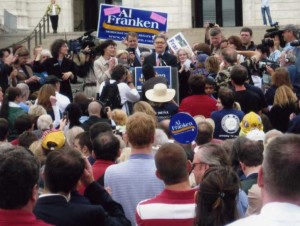#52 – Dick Bernard/Carol Ashley: Views on Economic Stimulus
UPDATE: Carol Ashley joined this conversation July 11 (her substantial contribution follows the initial post.) This will be held open till July 21, 2009.
Dick Bernard: This is the first blog post I have specifically posted in Draft form. I solicit specific, brief, comments to my regular e-mail address. When this paragraph is removed, the Draft will be in more or less final form.
Among the kettle-full of national and international issues roiling about this past week, discussion was stirring about the Stimulus. The usual suspects were saying the usual things about whether Round One was working or not, and whether or how a Round Two should be. Apparently the President is not in favor of a Round Two, at least not at this time.
All I can say is that I am glad I am not having to make these decisions.
It appears that, after the major crisis of 2008, that ordinary Americans are both saving more and spending less. Fewer people are earning any income, and those who are earning an income are not making as much as they were before. Times are tight. It doesn’t take a lot of looking to see that we’re not as flush as we were. Some think we’ll never recover; that the worst is ahead of us. Some would welcome such a failure, for differing reasons. Opinions are a dime a dozen.
Lately I have been wondering if, perhaps, we Americans are, right now, our own worst enemies. We are a nation whose prosperity was built on consumption. We can argue whether that is good or bad, but that is how capitalism thrived. And we are a capitalist society.
If my observation is a bit correct, rather than waiting for the government to print more money that we don’t have, perhaps a reasonable solution to propose is that we loosen our own individual pursestrings, and spend a little more of what we have, including our savings, to help stimulate the economy, particularly for those who really need the money the most. I’m not advocating randomly throwing money on the street, but finding ways to help people who will truly put the money in circulation, and help the economy recover.
We are not, even now, an impoverished nation: A single dollar per person would generate $300,000,000 in circulation; a little over $3 per person would generate one billion. Before long, there would be serious additional money in circulation. And if we did the seeding reasonably carefully, it would be spent to help others who need it. I once heard that a dollar spent multiplies by seven times if in circulation. $1=$7. It really isn’t funny math. Some folks would make the multiplier a different number than 7, but economists would agree that there is a multiplying effect when money is actually in circulation.
Of course, my idea of spending to prosperity isn’t new. I remember well the proposition of George W. Bush adminstration after 9-11: we Americans were admonished to go shopping.
The difference I see between his proposition, then, and mine, now, is a pretty stark one: were we to dig deep enough, the motivation for his proposal was to maintain and even build profits for business, using money we didn’t have (credit) to do that. We have seen, and we are experiencing directly, the results of that foolhardy policy.
In my case, I am proposing using money that is actually in existence to help people with real needs either stay on their feet, or get back on their feet.
Saving is great: I’m all for it. Spending is okay, too. I think we can help build our own recovery…and change the direction of our nation in the process.
Your thoughts?
Carol Ashley: I like your idea, but not because I think it would stimulate the economy. Helping others out with whatever we have that’s extra is a good idea because it is compassionate and there are so many people in need. In terms of the economy, I think we as Americans need to rethink how we live…as many are. We need to focus on what we need and not on what we want. We need to think about a more equitable society. The talk of stimulus is just a way of thinking in the same old ways that have, in part, brought us to this impasse. (And I do think it is an impasse.)
We need to create jobs that focus on real needs. Renewable energy is a good start because we need at least some energy, even if we all devote ourselves to conservation of energy. I expect that large companies will be the ones to do this because that is how our society is and larger companies are the only ones who could afford to do it. That is sad because we need to focus on smaller businesses that won’t be too big to fail.
There are lots of other things that we could do that are unrealistic to suggest because they just won’t happen because our country is too split and too selfish.
And now, as an aside I turn to something I’ve been hit with recently.
I confess that I am a Baby Boomer. I don’t do that easily. You see, I’ve always had the Boomers connected in my mind with the 60’s social justice issues. That’s in spite of stories my nephew has told me, in spite of what I’ve seen and heard from others of my generation, in spite of hearing us referred to as the Me Generation.
It wasn’t until I read more of The Fourth Turning by William Strauss and Neil Howe that I realized just how selfish my generation is. Of course there are exceptions. But I think my generation has had a lot to do with the current attitudes and the resultant crisis we are in. All the way from the good values of the 60’s to this! Of course, I now realize that many young people in the 60’s were in just for the ride, the excitement, the rebellion against authority. Perhaps they each had good reason and good cause. Perhaps most came to accept the broader values that came to the front at that time. But after the riots, after the end of the Vietnam war, and after a bit more equality for women, the Boomers really turned and stayed inward.
The focus turned to self-actualization, personal growth. I saw in the Charismatic movement of the 60’s and 70’s the focus on personal “spiritual growth.” The message was that if they saw a problem in your life, the answer was that you either didn’t have enough faith or the devil was in your life. If you were poor, sick or otherwise suffering, it was your fault. I saw the same thing from the New Age Movement. Many of the New Agers I have met through the years had originally turned from traditional churches to the Charismatic Movement and then became New Agers. The common theme I heard was that Christians were too judgmental, but I heard the very same judgment from them. If you were poor, sick or otherwise suffering it was your karma, you had not grown beyond that. It was your fault.
The one thing that bothered me as I followed that Boomer movement was the lack of compassion, the lack of any sense that we lived in a society that did have effects on people and a lack of any regard for science.
I do think a distrust of authority wasn’t all bad. I don’t think self-actualization is all bad. But anything can be taken to an extreme. It’s not good to throw out the baby with the bathwater, pardon the old cliché.
And now back to your suggestion. I think it is a good one, again not because of a need to stimulate the economy, but to take things into our hands to create a better society where we can help others out. I would like to see us use extra money we may have to start cooperative businesses that provide needs as well as provide jobs for people who have lost theirs. I think this would need to be done community by community.
What do you think?
Carol





